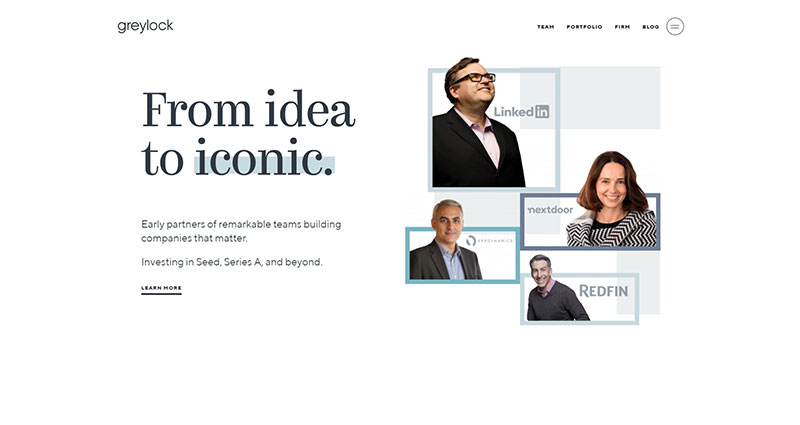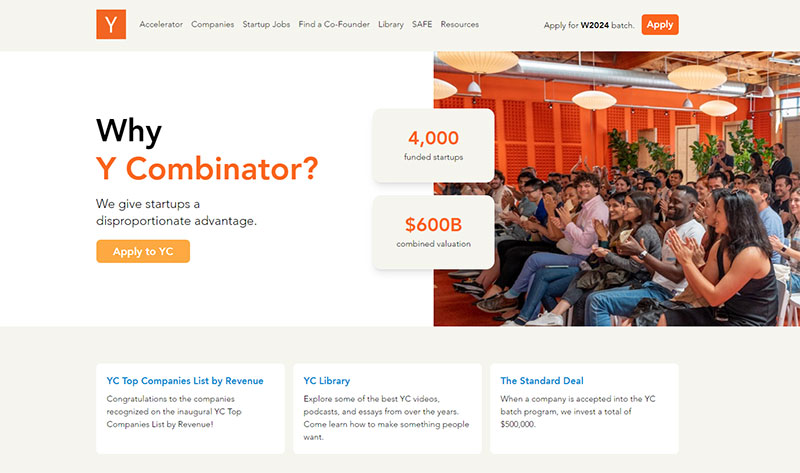Narrowing down the best venture capital firms is like navigating a complex labyrinth, where every turn promises the potential for breakthroughs or pitfalls.
As business owners, you’re backstage, prepping for the grand pitch; a performance that could secure your company’s spotlight in the market.
Piecing together the puzzle of investments, you know that a venture capital firm is more than a fund – it’s a partner in innovation, growth, and strategic vision.
Embark on this exploratory journey with me. Together, we’ll decode the intricacies of venture capital, from seed capital providers to IPO financing.
I’ll draw from the wisdom within the financial backbone of Silicon Valley and decipher the term sheets that lead to triumphant Series A, B, C funding stories.
Through this article, step into the world where financial backers become catalysts for tech startup rocket ships. Discover the insight that could pivot your quest for the golden ticket of equity financing.
The Best Venture Capital Firms
| Venture Capital Firm | Founded | Headquarters | Notable Investments | Sector Focus |
|---|---|---|---|---|
| Sequoia Capital | 1972 | Menlo Park, CA | Apple, Google, WhatsApp | Technology, Healthcare |
| Accel Partners | 1983 | Palo Alto, CA | Facebook, Slack, Spotify | Technology, Consumer, Enterprise |
| Greylock Partners | 1965 | Menlo Park, CA | LinkedIn, Airbnb, Coinbase | Technology, Consumer Internet, SaaS |
| Andreessen Horowitz | 2009 | Menlo Park, CA | Twitter, Pinterest, Lyft | Technology, Media, Healthcare |
| First Round Capital | 2004 | San Francisco, CA | Uber, Square, Warby Parker | Technology, Consumer |
| Y Combinator | 2005 | Mountain View, CA | Airbnb, Dropbox, Reddit | Early Stage Startups |
| Kleiner Perkins | 1972 | Menlo Park, CA | Amazon, Twitter, Snap | Digital, Healthcare, Greentech |
| Bessemer Venture Partners | 1911 | Redwood City, CA | LinkedIn, Yelp, Shopify | Enterprise, Consumer, Healthcare |
| Founders Fund | 2005 | San Francisco, CA | SpaceX, Palantir, Stripe | Diverse: Technology, Biotech, Aerospace |
| Battery Ventures | 1983 | Boston, MA | Akamai, Nutanix, Wayfair | Technology, Industrial, Enterprise |
| Intel Capital | 1991 | Santa Clara, CA | VMware, McAfee, Cloudera | Technological Innovation |
| Firstmark Capital | 2008 | New York, NY | Pinterest, Shopify, Riot Games | Internet, Software, E-commerce |
| Keiretsu Forum | 2000 | Walnut Creek, CA | Mattersight, Instaply, OptiMedica | Diverse: Technology, Real Estate, Healthcare |
Sequoia Capital

Sequoia Capital is like that friend who sticks with you through thick and thin. Based in sunny California, they’ve been around since the ’70s, focusing on all sorts of cool stuff like energy, finance, healthcare, and tech.
What makes them one of the best venture capital firms? They don’t just throw money at you and walk away. Nope, they stay with you, like partners in crime, for the long haul.
They’ve put their money into over a thousand companies, including some big names like ByteDance, Canva, and Stripe.
And they’re not just about the big guys; they’ve got some significant investments in India too, like Justdial and Byju’s. Oh, and did I mention they had a hand in Apple, Google, and Nvidia? Yeah, they’re kind of a big deal.
Accel Partners

Accel, or Accel Partners as they used to be called, is like the nerdy kid who grew up to be super successful. Founded in the ’80s in Palo Alto, California, they’re all about things like software, mobile tech, and the internet.
These guys have a way of thinking they call the “Prepared Mind.” It’s like doing your homework before a big test. They research, they plan, and they make decisions that make sense. It’s their thing, and it’s made them stand out in a world that often goes with the gut.
With a whopping $3 billion in investments, they’ve backed companies like Facebook, Spotify, and Etsy.
They’ve made a ton of investments, and a good chunk of them have turned a profit. Accel’s like the wise old owl of venture capital firms, and they’ve got the track record to prove it.
Greylock Partners

Greylock Partners is like the grandparent who’s still hip and happening. They’ve been around since the ’60s, but they’re all about the new and exciting world of consumer and enterprise software.
What’s their secret sauce? They believe in supporting the dreamers, the ones who want to change the world.
They’re not just throwing money around; they’re investing in ideas and people that can make a real difference.
With over $3.5 billion under their belt, they’ve been part of some massive successes like Airbnb, Facebook, and LinkedIn.
They’ve led loads of profitable deals and IPOs, including a recent one with Zuora that made a splash.
Greylock’s like the wise elder in the world of venture capital, with the energy and vision to keep up with the young guns. They’ve got the experience, the funds, and the belief to make them one of the best venture capital firms out there.
Andreessen Horowitz

Imagine a place where all the cool tech stuff comes together. That’s Andreessen Horowitz, or a16z if you want to be hip about it.
Founded by Marc Andreessen and Ben Horowitz in 2009, these guys are all about the future.
Biotech, healthcare, games, crypto – you name it, they’re into it. They’re like the wizards of the tech world, always looking for the next big thing.
And they’re not just playing around; they’re leading the way in blockchain and crypto, with a vision that’s all about the long game.
With $4.2 billion in assets, they’re one of the best venture capital firms out there. They’ve got their fingers in over 700 startups, including big names like Facebook, Slack, and Lyft.
And they’re not just sticking to the old stuff; they’re diving into the world of Web3 and backing companies that are shaping the future.
First Round Capital

First Round Capital is like that friend who always knows the next big trend. Based in Philadelphia and founded by Joshua Kopelman and Howard Morgan in 2004, they’re all about catching the wave before it breaks.
They’re into everything from hardware to healthcare, fintech to tech-tech. They believe in the power of the early stage, like planting a seed and watching it grow.
They’re not just guessing, though; they use data to find the companies that have what it takes.
With over $1 billion in capital, they’re one of the big players in the game. They’ve backed more than 150 companies, including the likes of Uber, Square, and Warby Parker.
They’re not just following the crowd; they’re leading the way, making them one of the best venture capital firms on the planet.
Y Combinator

Y Combinator is like the wise mentor for young companies. Founded in 2005 and based in Mountain View, California, they’re all about helping the little guys become the big guys.
“Make something people want.” That’s their motto, and they live by it. They’re not just throwing money around; they’re helping companies build their products, strategies, and teams. They’re like the coaches in the big game, pushing for change in how companies get funded.
They’re into everything from education to real estate, healthcare to government. The companies they’ve helped are worth a staggering $80 billion.
They’re not just a venture capital firm; they’re an accelerator, a catalyst for change, and one of the best venture capital firms in the business.
Y Combinator is like the superhero team of the startup world. They’ve invested in over 1,000 companies, and not just any companies, but big names like Dropbox, Airbnb, Coinbase, and even some cool Chinese startups like Raven Tech.
They’re not just about making money; they’re about making dreams come true. They even let nonprofit organizations join their main program.
Kleiner Perkins

Founded way back in 1972, Kleiner Perkins is like the wise elder of the venture capital world. Based in Menlo Park, California, they’re all about investing in everything from business products to cybersecurity, and they’re not just sticking to the U.S.; they’re going global.
These guys have been behind some of the biggest names in the game, like Google, Amazon, Facebook, and Spotify. They believe in bold ideas and big dreams, partnering with founders from the start to the finish line. With over 900 ventures and around $9 billion raised, they’re not just playing the game; they’re changing it.
Bessemer Venture Partners

Bessemer Venture Partners is like the adventurous explorer of the venture capital world. Founded in 1911 and based in Redwood City, California, they’re all about the future, investing in everything from software to cryptocurrency.
With offices all over the world and more than $4 billion in investments, they’re one of the best venture capital firms out there. They’re not afraid to take risks, with investments ranging from $100k to $75m.
They’ve got a portfolio of 756 companies, including big names like LinkedIn, Shopify, and Twitch. Their latest investment? Oshi, on April 11, 2023.
Founders Fund

Founders Fund is like the visionary artist of the venture capital world. Founded in 2005 and based in San Francisco, they’re all about the cutting edge, investing in everything from biotech to nanotech, aerospace to media.
With more than $11 billion under their belt, they’re one of the best venture capital firms in the business.
They’ve had 128 portfolio exits, including big wins with Nubank, Facebook, and Spotify. They were the first to invest in SpaceX and Palantir Technologies, and their partners have been part of some of the biggest names in tech, like PayPal, Google, and SpaceX.
Battery Ventures

Imagine a group of people who are all about the future, always looking for the next big thing in tech. That’s Battery Ventures for you. Founded in 1983, these folks are on a mission to find the coolest technology and software companies out there.
They’re not just hanging out in one place. They’ve got offices in Boston, Silicon Valley, San Francisco, Israel, and London. They’re looking for the best in application software, infrastructure software, consumer stuff, industrial tech, and even life science tools.
They’ve raised over $13 billion since they started, and they’re now working with their fourteenth funds, with a combined capitalization of $3.8 billion. That’s a lot of zeros!
They’ve got a portfolio of 612 companies, and they’ve had 276 exits. Some of their big wins include Sprinklr, Splunk, and Guidewire. They’re not just playing the game; they’re one of the best venture capital firms out there.
Intel Capital

Intel Capital is like the big brother of the tech world. Established in 1991, they’re all about the United States, China, and Western Europe. They’re looking for the next big thing in AI, 5G, Cybersecurity, and more.
They’ve made over 1,300 investments, and when they lead the round, their success rate jumps to 83%.
Some of their big exits include Animoca Brands, Schoology, and MongoDB. They’re not just a corporate venture capital division; they’re one of the best venture capital firms in the game.
Firstmark Capital

FirstMark Capital is like the dream team for entrepreneurs. Founded in 2008 in New York, they’re all about partnering with people who want to change the world by solving real problems.
They’ve made 245 investments in everything from early-stage ventures to series C rounds. Some of their portfolio companies include Ada Support, Aura, and Justworks.
They’ve had 31 exits, with big wins like Riot Games, Shopify, and Upwork. With nine funds raised, they’re not just playing around; they’re one of the best venture capital firms out there.
Keiretsu Forum

Keiretsu Forum is like the United Nations of investors. Founded in 2000 and based in San Francisco, they’re all about diversity, looking for opportunities in everything from emerging technologies to real estate.
They’re not just venture capitalists; they’re angel investors, corporate investors, and institutional investors.
They’re looking for the early-stage firms that have what it takes to make it big. They’re not just a Venture Network firm; they’re one of the best venture capital firms in the business.
How to Approach VC Firms: A Simple Guide

So you’ve got this amazing idea, and you want to get it in front of the best venture capital firms. But how do you do that? Let’s break it down into simple steps.
Tips for Getting in Touch and Making Your Pitch
1. Find the Right Investor
You wouldn’t ask a fish to climb a tree, right? Same goes for investors. Find the ones that are into what you’re doing.
2. Prepare Your Pitch Deck
Think of this as your business’s greatest hits album. It’s got to be catchy, exciting, and tell them everything they need to know.
3. Have the Right Type of Business
Make sure your business is the kind they invest in. If they’re all about tech, and you’re selling handmade soap, it might not be a match.
4. Focus on the Market
Show them that people want what you’re selling. It’s like saying, “Look, everyone loves this song, so let’s make an album.”
5. Know Your Numbers
This is where you show them you’ve done your homework. How much will it cost? How much can you make? It’s like planning a tour and knowing all the details.
6. Be Honest About Your Team
If your drummer can’t keep a beat, they need to know. But also show them how you’re going to find the best drummer out there.
7. Find Good Advisors
These are like your roadies, the people who help you make it all happen. Show them you’ve got a great crew.
How to Send Your Pitch
You can send it online or the old-fashioned way, in the mail. They’ll look at your email or letter and your investment deck to see if they’re interested.
Make Those First Few Seconds Count
You’ve got to grab them right away, like a hit song that makes you want to dance. Make it strong, make it exciting, and make them want to hear more.
Building Relationships with VC Firms: It’s Like Making Friends
Communicate Well
Talk to them, keep them in the loop, and make sure you’re all on the same page. It’s like keeping the band together.
Set Goals and Expectations
Know what you want, know what they want, and make sure everyone agrees. It’s like planning a setlist that everyone loves.
Keep Them Engaged
Keep them interested, keep them excited, and keep them believing in you. It’s like putting on a great show, night after night.
Build Real Relationships
Be yourself, be honest, and be respectful. Show them your vision, but also show them the real you. It’s like making friends with your fans.
Remember, It’s About Relationships, Not Deals
You’re not just making a deal; you’re starting a relationship. Keep in touch, be nice, and make it a friendship that lasts.
FAQ On Best Venture Capital Firms
What makes a venture capital firm “the best”?
It’s their track record. The best have a knack for backing unicorns and possess a stellar return on investment. But hey, it’s not just about the money.
Top firms offer invaluable mentoring, industry connections, and are a tech startup’s North Star. They’ve got the wisdom—part intuition, part experience.
How do I approach top venture capital firms?
First, polish your pitch. Know your numbers, your market, and your team like the back of your hand. Then, research fit. A healthtech firm won’t bite for a fintech idea.
Networking is key. Warm introductions from mutual connections can open doors—make LinkedIn your friend. Be confident, not desperate.
What do venture capital firms look for in a startup?
It’s a blend. They want that gut-punch wow factor—innovation that stands out. Plus, a solid business model, scalability, and a killer team.
They’ve got an eye for market potential and traction. Got users? Growing revenue? They’re interested. Show them a future where everyone’s making bank.
What percentage do venture capital firms usually take?
No fixed rate—it’s a tango. Expect anywhere from 10% to 50%, depending on the investment stage, amount, and your company’s valuation.
They’re looking for a substantial enough equity stake to justify the risk, but it’s always a negotiation. Early-stage? Higher percentage. Proven track record? You’ve got more sway.
What is the typical investment horizon for venture capital firms?
Think of it like a chess game—strategic and time-bound. VC firms usually play the long game, eyeing a horizon of 5 to 10 years before they look for an exit strategy.
They’re in it to multiply their stake, and that takes time—growing businesses, scaling up, maybe even prepping for an IPO.
How do venture capital firms value a startup?
Valuation’s part science, part wizardry. They’re combing through your finances, yes, but also sizing up your team, IP, and growth potential.
They’ll consider market comparables, but it’s the due diligence process that uncovers the gold. Remember, the pre-money and post-money valuation dance is key here.
Can you negotiate with venture capital firms?
Absolutely, it’s all about the give-and-take. Consider your offer as the first step in a partnership. Terms like valuation, equity, and board representation are all on the table.
Know what matters most to you, stand firm on those points, and stay flexible elsewhere. And always read the fine print.
What happens if a venture-backed startup fails?
Reality check—it’s not uncommon. But here’s the deal: some funds are from limited partners who are risk-aware.
Failure’s part of the game. The aim is to balance the portfolio with other wins. For you, it’s about learning, pivoting, and if necessary, moving on gracefully.
What makes a successful venture capital investment?
You’re looking for that alchemy between the right investment criteria and the perfect opportunity. Success means the startup scales, blows the market away, and everyone enjoys a hefty return on investment.
The venture capital firm nails the support, networking, and growth strategy, and the startup delivers performance at its peak.
How do venture capital firms contribute beyond capital?
It’s more than just a cash injection. The best firms bring industry expertise, mentorship, and open doors wider than any you’ve seen.
They’ll help tighten your business strategy, connect the dots with key partnerships, and sometimes even offer a shoulder to lean on. Money’s just the beginning.
Conclusion
Sifting through the best venture capital firms, it’s clear. You’re not just picking a financier; you’re choosing a path, a partner to the summit. Whether it’s Sequoia’s battlefield wisdom, Andreessen’s tech savvy, or Kleiner Perkins’ green thumb for growth—that choice sets the stakes, high and real.
Here’s the wrap:
- You’re primed with seed capital knowledge.
- Got pitch techniques down pat—that’s your sword.
- Understand that the equity stake game is one of balance.
- Locked into the investment horizon, your sights on that long-haul prize.
And remember, IPO financing, Series A, B, C funding tales—they’re not just stories. They’re your potential futures.
Never underestimate the fusion brought by a top-shelf venture firm, with your crafted innovation. It’s powerful—a blend ripe with possibility. Make bold moves, chart brave courses, and may the best in business, the firm that believes in your leap, guide you to stellar success.

